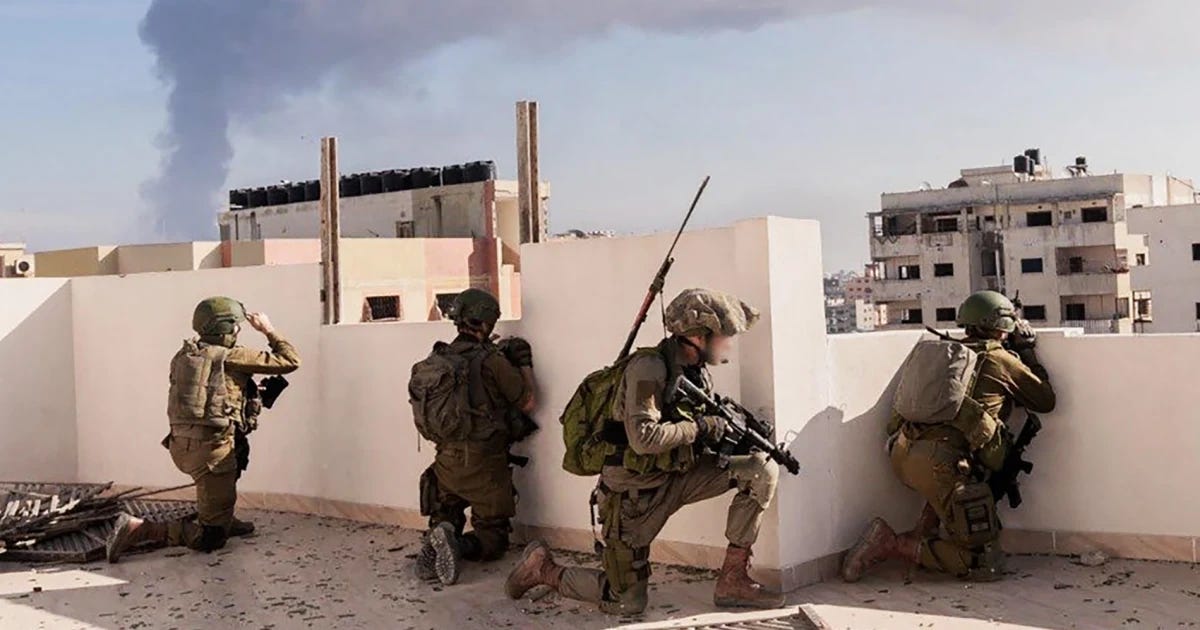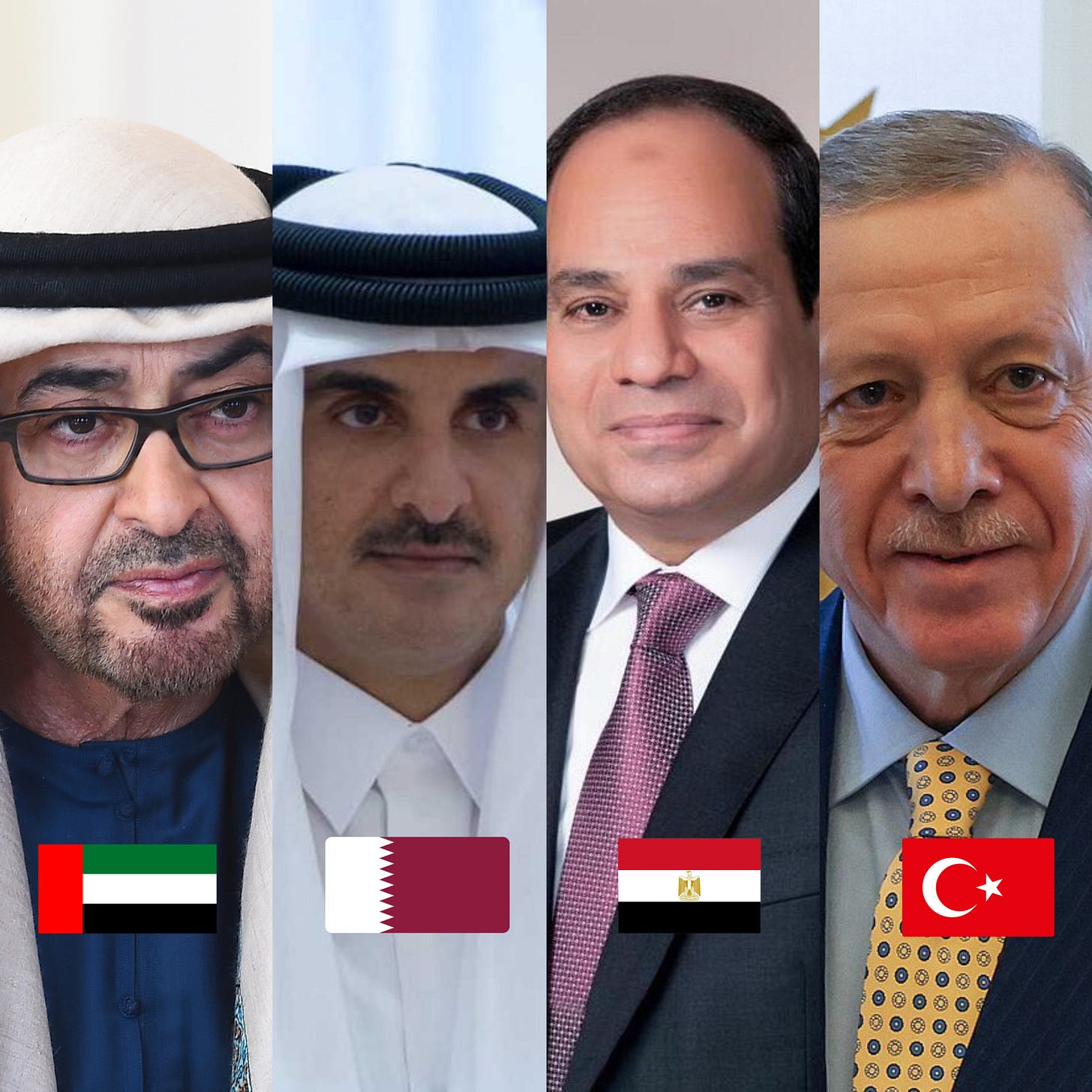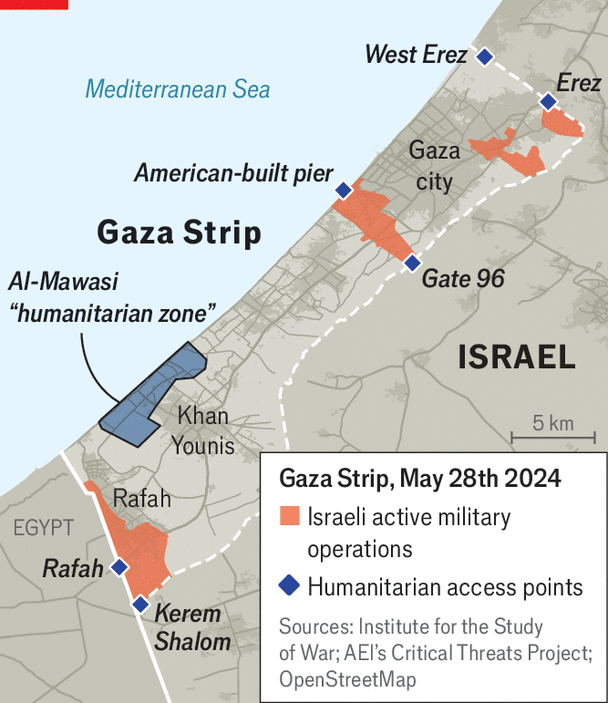The “day after” has become a U.S. State Department shorthand for two things, one narrow, and one broad. On the narrow end, it refers to the postwar settlement of three basic questions:
Who will pay to rebuild Gaza?
Who will govern Gaza?
How much can Israel alter the facts on the ground before the Americans, Arabs, and Europeans mount enough pressure to compel it to accept their answers?
On the broader end it refers to a grand strategic vision and a fundamental realignment of the Middle East. Let’s discuss all of it.
Given that the status of assistance to Ukraine is up in the air, it is a safe bet that a Trump administration will not be financing the reconstruction of Gaza. There is little appetite in America right now to be involved in foreign entanglements any more than is strictly necessary. To compensate, Europeans will have to increase their own spending on Ukraine’s defense, and on their own militaries. They might show up for some of the photo-ops, and may put up funds for some high-profile projects, but they cannot afford the bill either. The Chinese are already in an economic death spiral of their own making. That leaves the Arab monarchies. With untold hoarded trillions in oil wealth squirreled away in sovereign wealth funds, they can certainly foot the bill. The Arabs currently rely on the Americans to guarantee their security from external threats so that their security services can focus on tamping down on internal ones. Who these Arab states perceive as the biggest external threat will determine where their diplomatic energies will be directed.
The lead up to the disaster of October 7th, and the disaster itself showed the Arab world two things: Israel is more vulnerable than its technological sophistication and economic might suggests, and that Israel is doggedly determined to eliminate that perception and restore deterrence. The logic of Saudi-Israel normalization from the Saudi perspective was to supplement the Americans as regional security guarantors, and meld Arab financial capital with Jewish human capital. The long-term logic has not disappeared, but the short-term calculus for Saudi Arabia regarding its security needs has changed, so the price for a normalization deal has increased, and the Saudis are de-risking by slowly continuing a rapprochement with Tehran. It’s easily observable given the very recent meeting between Iran, Saudi recommitting to the Beijing Agreement hosted by China. That leaves the realistic alternatives to Riyadh narrowed down to the Emirates, Qatar, Egypt, and Turkiye.
Qatar:
The Qataris are a major non-NATO ally. They host the U.S. Air Force at Al-Udeid. Al-Udeid is a security blanket, but what gave them relevance was their status as an open line of communication to entities Washington would prefer not to engage with directly. The brutality of the October 7th attacks combined with the reality that Qatar provided sanctuary to Hamas leadership during its planning and execution means that if there is a hostage deal, Qatar becomes irrelevant. But, the execution of hostages including Hersh Goldberg-Polin means Qatar continuing to host Hamas poses a risk of losing their security blanket. So, the Qataris’ played one of their two remaining hands: they removed themselves as mediators and told Khaled Mashaal to pack his bags. The other hand they have left to play is mute the poison they are pumping into the air waves via al-Jazeera. And while Qatar can afford to pay the salaries of Palestinian civil servants to administer the Gaza Strip, they cannot finance the reconstruction by themselves.
Emirates:
The Emirates, to their benefit, choose to keep their hands mostly clean of Palestinianism. They’ve been doing well since signing the Abraham Accords. It should be said though that they did demand a price for signing: a freeze on any Israeli settlement annexations, along with the ability to purchase F-35s for themselves. Its still a win, and we can certainly expect to hear more in the near future. The newswires in Washington buzz with rumors surrounding the return of the “Deal of the Century” proposed by Jared Kushner during Trump’s first term. The appointment of Mike Huckabee as Ambassador to Israel, and the appointment of Elise Stefanik as the American pitbull in the United Nations suggests there is credibility and meat to these rumors. The Emiratis continue to publicly enjoy the benefits from melding Arab finance with Israeli human capital. More discreetly however, do they enjoy cooperation on intelligence and security matters. They can also be negotiated with, it’s refreshing. The Emirates need to hedge against their Arab street - so they require some kind of concession from Israel in relation to expanded Palestinian autonomy. By themselves, the Emiratis’ do not have the security forces to stabilize Gaza, so either the IDF will retain a security presence in the Gaza Strip for some to-be-agreed-upon length of time, or other partners will need to be brought abroad.
The Europeans expressed a willingness to restart their Rafah monitoring mechanism, but the lessons of UNIFIL and Security Council Resolution 1701 elicits justifiable skepticism in Jerusalem. In summary, the Emirates, Qatar, and Saudi Arabia will be footing the bill, but they do not have the forces necessary to stabilize the Strip. Israel cannot afford to entangle significant resources in Gaza as it did in South Lebanon between 1982-2000, but it cannot afford to abandon freedom of action in Gaza as it did in 2005. It’s not such an easy quandary for us, who could have seen that coming?
Egypt:
With the Qataris out as the mediators, and the Hamas politburo outside of Gaza packing their bags, the task of negotiating a ceasefire arrangement now falls to Egypt, and likely Turkey. And there will be an agreement, because President Sisi publicly announced frameworks designed to lead to a deal. The Egyptian ‘mini-deal’ and the Russian ‘mini deal’ (for the two hostages with Russian passports) are efforts at confidence-building between the negotiating sides. Qatar stepping away means Israel and the Americans have one less parties’ interest to consider.
The Americans:
In any case the high-intensity operations that marked the first four months of war have ended. The IDF recently completed the construction of a new corridor which cuts off Jabaliya, Beit Lahiya and Beit Hanoun from Gaza City: the West Bankification of Gaza is now 70% complete. Furthermore, Israel has finally kneecapped UNRWA, which for two decades alleviated Palestinian groups of their core governing responsibilities and allowed them to focus on building their terrorist infrastructure. Before the presidential election, Biden issued a series of demands of Bibi - who, not being able to predict the future, was forced to hedge his bets in case a Democrat returned to the White House. Sinwar, before his untimely death (should have been way sooner), made his own hedge after recognizing that Iran and Hezbollah would not save him. He hitched his best bet on the Biden-Harris adminstrations’s foreign policy team. It did not pan out.
Israel did comply with American demands. The al-Mawasi humanitarian zone increased in size by 25%. The IDF reopened a new port of entry for humanitarian assistance at Kissufim. Israel delisted certain items from their ‘dual-use’ goods list, and the IDF recently completed a new access road for humanitarian assistance to better facilitate deconfliction and reduce interdiction of aid. A bilateral mechanism for addressing incidents involving civilian casualties will meet for the first time in December. The IDF remains treading water in a counterinsurgency posture: raiding and clearing, but not holding areas. Ongoing tasks remain the fait accompli of a cordon sanitaire on the Palestinian side of the Gaza envelope and the fortification of the Northern (Jabaliya), Central (Netzarim), and Southern (Philadelphi) Corridors’. Israel is shaping the “day after” by creating new facts on the ground. In the face of an overwhelming Trump mandate, any Executive Action enacted by Biden will likely be reversed by the Trump administration when it assumes office, which leaves Biden with one realistic tool: to relinquish the American veto at the UN Security Council and allow the imposition of terms by the international community that ensure the survival of Hamas. If that transpires, then Netanyahu in my view, must accept a hostage deal, end this current military operation - and then resume operations at a later date.
The focus of the IDF has for months been on the Northern border. After Operation Grim Beeper’ and the decapitation of the senior leadership of Hezbollah, an engineering operation supported by infantry maneuvers has gradually cleared out military infrastructure along the border, while the Air Force continued to deteriorate their stockpiles of drones, rockets, and rocket launchers. The mid-level command has been decimated. Demoralized rank and file have melted away among throngs of Shi’ites fleeing to Syria alongside former Syrian refugees. The Biden administration has ‘reversed’ its thinking: calm in Lebanon will lead to calm in Gaza. Lebanon wants a ceasefire, Hezbollah wants a ceasefire (but cannot say so publicly), and Israel has applied the lesson of the last Lebanon War in insisting on a mechanism to enforce 1701 itself, and retain freedom of action. Lamentations about the loss of Lebanese sovereignty are crocodile tears, Lebanon was eaten away by Hezbollah and Hafez al-Assad’s imperialist fantasies before them. There are details regarding the ceasefire that remain unclear: who will be part of the dispute resolution mechanism, and how will it function? What, if any, will UNIFIL’s role be? What will backstop the Lebanese Army? And to what extent will Israel retain ‘freedom of action’ to prevent Hezbollah from re-supply? These questions will be answered in time.
Turkiye:
In setting the table for the day after the “day after” the only realistic option is Turkey. Unlike the Arab states, Turkey is a NATO member. Not only that, it has the second largest standing military in NATO. As America retreats behind the curtain of isolationism, this is the next best thing. It maintains the “FaFO” dilemma for the mullahs and what is left of the Axis of Resistance. Unlike the Arab states, which are palace guards focused on quelling internal dissent, the Turkish military has battle experience - fighting Kurdish insurgent groups, the Islamic State, and in their operations in Northern Syria. Israel’s warm relations with the Kurds give it some negotiating leverage in the contest for Syria to an arrangement that prevents, or at least limits the flow of Iranian arms through Syrian land and airspace.
That is not to suggest a deal with Turkey will be easy. Erdogan’s AKP suffered defeat in local councils, largely due to a collapse in voter turnout among his rural, nationalist, and religiously conservative power base. To shore up that support, he has spent the year vacillating between threatening to invade and destroy Israel, and warning that if Hamas is defeated the ‘Zionists’ would come to swallow the whole of the Middle East. Turkish media is state-controlled and pushes a pro-Hamas narrative. To further up support, Erdogan joined South Africa’s lawfare at the International Court of Justice. In May, he announced the suspension of trade with Israel ‘until a permanent ceasefire’ in Gaza. Israel imports far more from Turkiye than it exports, making it a key source of foreign currency at a time where Erdogan’s mismanagement of the economy has pushed inflation higher, further fueling political resentment at home. The suspension is temporary, and is a means of pressuring Israel into accepting a deal. It is also largely theatrical: goods are still being transferred from Ankara to the Palestinian Authority, diplomatic and intelligence relationships remain intact. Oil from Azerbaijan - some 40% of Israel’s total energy imports - flows uninterrupted under Turkish soil. And, because most of the trade between Turkey and Israel is facilitated by Turkish Jews, many of those companies have simply relocated to Cyprus, a loophole that Erdogan has so far left open.
The trade relationship will be restored once a ceasefire is in place in Gaza. Israel should preserve the current diplomatic contacts it has and avoid taking Erdogan’s bait. The end of hostilities against Hezbollah and Hamas will lead to a restoration of economic ties. There will come a time where Erdogan will no longer lead, and Turkey may rebalance towards a more secular, Kemalist nationalism. Turkey is a realistic guarantor to interdict weapons supplies to Hezbollah. The Turkish Nav is the only one in the region with enough force projection to deploy to the Straits of Hormuz, and maintain order in the Bab el-Mandeb. Combining Israeli air power with Turkish naval power could tilt the short term Saudi security calculus back towards a normalization agreement. Turkey would be considered a much more credible mediator between Israelis and Palestinians in the event of a resumption of the ‘peace process’, and Israel would likewise be a credible mediator to tamp down tensions between the Turks and the Kurds. The signals are already being sent. Foreign Minister Fidan declared two days ago that he looks forward to strengthening bilateral ties with the Americans, and resolving disputes with his Greek friends.
The development of a stable diplomatic and security framework between Israel and Turkiye is what will unlock the grandiose “day after” espoused by Blinken, McGurk, Hochstein, and Sullivan. This framework unlocks normalization with Saudi Arabia. Turkey despite the Islamist ramblings of Erdogan, is still home to a sizable Jewish community, meaning the people-to-people ties do not need to be built from scratch. This framework preserves the prospects for a solution, and creates a checkmate strategic overmatch against the Iranian regime.
- Abba Eben







Great analysis as always, extremely impressed with how in depth you go!